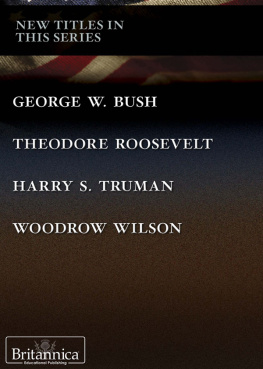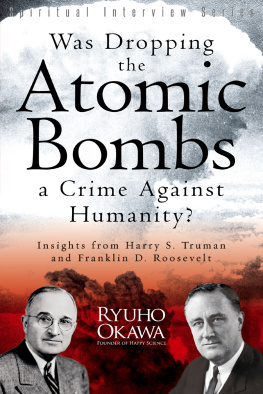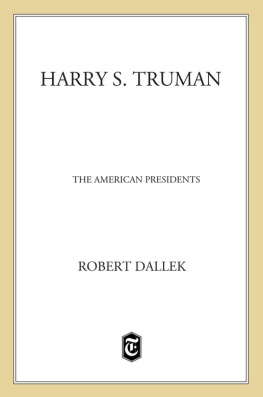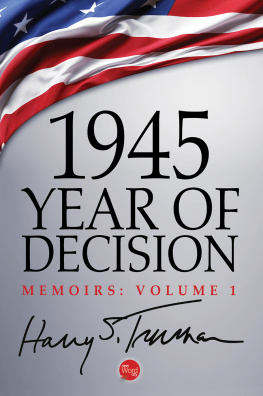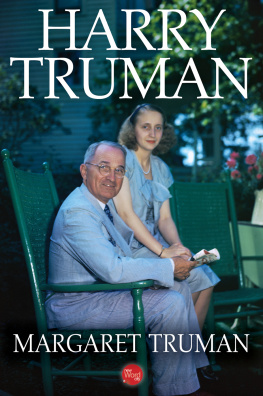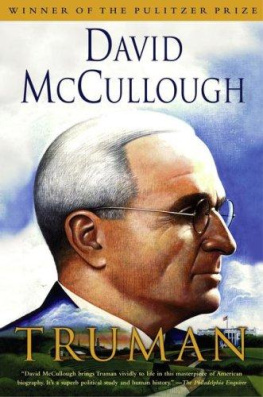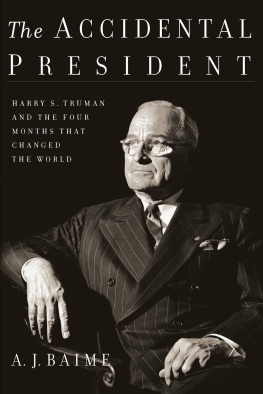HARRY S. TRUMAN
Harry S. Truman presided over one of the most challenging times in American history the end of World War II and the onset of the Cold War. Thrust into the presidency after Franklin D. Roosevelt died in office, Truman oversaw the transition to a new, postwar world in which the United States wielded the influence of a superpower. With his humble beginnings and straightforward manner, Truman was the personification of a typical American. As president, Truman oversaw the decision to drop the atomic bomb, the integration of the military, and the development of an interventionist foreign policy aimed at containing Communism, which ranged from providing aid to Europe through the Marshall Plan to fighting the Korean War. In the post-Cold War era, Harry S. Truman: The Coming of the Cold War provides insight into a pivotal moment in history that laid the foundations of today's politics and international relations.
In this concise and accessible biography, Nicole L. Ansolver addresses the president's political and personal life to explore the lasting impact that Truman had on American society and America's role in the world. Supplemented by a diverse array of primary documents, including presidential addresses, private letters, and political cartoons, this narrative presents a key American figure to students of history and politics.
Nicole L. Anslover is Assistant Professor of History at the University of Indiana Northwest.
ROUTLEDGE HISTORICAL AMERICANS
SERIES EDITOR: PAUL FINKELMAN, ALBANY LAW SCHOOL
Routledge Historical Americans is a series of short, vibrant biographies that illuminate the lives of Americans who have had an impact on the world. Each book includes a short overview of the person's life and puts that person into historical context through essential primary documents, written both by the subjects and about them. A series website supports the books, containing extra images and documents, links to further research, and where possible, multi-media sources on the subjects. Perfect for including in any course on American History, the books in the Routledge Historical Americans series show the impact everyday people can have on the course of history.
Woody Guthrie: Writing America's
Songs Ronald D. Cohen
Frederick Douglass: Reformer and Statesman
L. Diane Barnes
Thurgood Marshall: Race, Rights, and the Struggle for a More Perfect Union
Charles L. Zelden
Harry S. Truman: The Coming of the Cold War
Nicole L. Anslover
John Winthrop: Founding the City upon a Hill
Michael Parker
John F. Kennedy: The Spirit of Cold War Liberalism
Jason K. Duncan
Forthcoming:
Laura Ingalls Wilder: American Writer on the Prairie
Sallie Ketcham
Ronald Reagan: Champion of Conservative America
James Broussard
Bill Clinton: Building a Bridge to the New Millennium
David H. Bennett
Sojourner Truth: Prophet of Social Justice
Isabelle Kinnard Richman
Woodrow Wilson: Progressive President or Moral Crusader?
Kelly A. Woestman
HARRY S. TRUMAN
THE COMING OF THE COLD WAR
NICOLE L. ANSLOVER
First published 2014
by Routledge
711 Third Avenue, New York, NY 10017
Simultaneously published in the UK
by Routledge
2 Park Square, Milton Park, Abingdon, Oxon OX14 4RN
Routledge is an imprint of the Taylor & Francis Group, an informa business
2014 Taylor & Francis
The right of Nicole L. Anslover to be identified as author of this work has been asserted by her in accordance with sections 77 and 78 of the Copyright, Designs and Patents Act 1988.
All rights reserved. No part of this book may be reprinted or reproduced or utilized in any form or by any electronic, mechanical, or other means, now known or hereafter invented, including photocopying and recording, or in any information storage or retrieval system, without permission in writing from the publishers.
Trademark Notice: Product or corporate names may be trademarks or registered trademarks, and are used only for identification and explanation without intent to infringe.
Library of Congress Cataloging-in-Publication Data
Anslover, Nicole L.
Harry S. Truman: the coming of the Cold War / Nicole L. Anslover.
pages cm. (Routledge historical Americans)
Includes bibliographical references and index.
1. Truman, Harry S., 18841972. 2. PresidentsUnited StatesBiography.
3. United StatesPolitics and government19451953.
4. United StatesForeign relations19451953. 5. Cold War. I. Title.
E814.A83 2013
973.918092dc23
[B]
2013010032
ISBN: 978-0-415-89566-8 (hbk)
ISBN: 978-0-415-89567-5 (pbk)
ISBN: 978-0-203-08166-2 (ebk)
Typeset in Minion and Scala
by Apex CoVantage, LLC
CONTENTS
With his humble beginnings and straightforward manner, Harry S. Truman exemplifies the story of a typical, hardworking American. His actions as president, however, set him apart from any other figure in history. As president, Truman presided over one of the most trying, frightful, and complicated eras in American historythe end of World War II and the onset of the Cold War. Truman's decisions in both foreign and domestic policy turned America in a new direction, while his down-to-earth style of politics made him relatable to the average American.
Although he left office with record low approval ratings, Truman has recently been the subject of historical reassessment. Scholars and the public are both beginning to study the significant impact of the Truman presidency. Now that we are living in the post-Cold War era, Truman and the origins of the Cold War provide us with a broader context for how politics and international relations have evolved. Truman did not enter office blessed with the charisma and political acumen of his predecessor, Franklin D. Roosevelt; nor did he enter office an international hero, as did his successor, Dwight D. Eisenhower. But Truman arguably presided over one of the most challenging times in American historythe transition to Cold War society, both domestically and internationally.
The main objective of this biography is to demonstrate the lasting impact that Truman had on American society and America's role in the world. While in office, Truman had to shift both the mindset of the population and the economy from a wartime country to a people ready to take on the role as a world leader. Truman was also the first president to lead the new superpower and to navigate exactly what that term meant.
In order to understand the importance of the Truman era, it is essential to understand how and why he made his decisions. It is critical to look at the major events of Truman's life that molded his character before he entered the White House: his service in World War I, his marriage to longtime love Bess, and his senate career. The pre-presidential period of his life shaped his personality, and the man that entered the White House was hard-working, loyal, stubborn, and blunt. Truman formulated foreign policy during one of the most difficult periods of American history and he did so with almost no experience in international relations. Truman was forced to learn as he went along and to allow his diplomacy to evolve with changing world events. Domestically, Truman was more certain about what agenda he wanted to pursue. He was not one to compromise on his goals for the sake of popularity or making gains in politics. For this reason, Truman's domestic policies oft en failed. However, Truman never stopped trying to implement the liberal agenda in which he believed. Although he left office very unpopular, Americans would later come to appreciate the values that Truman brought to both his policies and the office of the presidency: honesty and determination. This work seeks to evaluate both Truman's successes and his failures and place them in their proper historical context.


